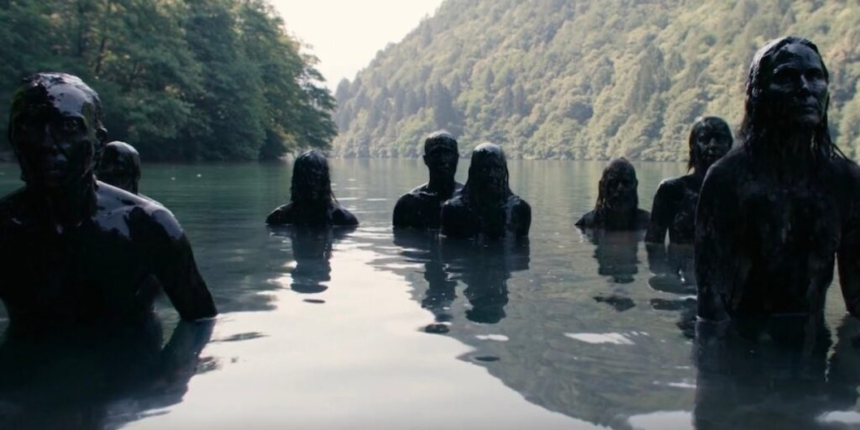Montreal Nouveau 2020 Review: THE BOOK OF VISION, Visual Beauty Hides A Flimsy Narrative

The study and treatment of ailments of the human body is certainly one of the most fascinating of histories; the way look back in shock on how illnesses were once treated (leeches, blood-letting), people of the future might one day look back on us (we point lasers into our eyeballs, after all). So a story that looks at a turning point in medical history - when doctors became less holistic when understanding their patients' health problems - should, in theory, be interesting, especially if it also offer a comparison/mirror to contemporary times, as we move towards understanding how physical and mental health are connected.
However, it would seem director Carlo Hintermann had something else in mind; or more to the point, had many other things in mind but ultimately couldn't decide so just included everything he could think of. The result is The Book of Vision; Hintermann's fiction feature debut, co-written with Marco Saura and executive produced by Terrence Malick, the film might be visually stunning in some scenes, but is a narrative mess, with subplots introduced and then dropped, double-casting that makes little sense, and an incosistentency that makes for baffling viewing.
In the present day, Eve (Lotte Verbeek) gives us a promising career as a surgeon to pursue studies in the history of medecine; specifically, the 18th century, and a time at which, according to her, doctors stopped talking to their patients and saw them as merely objects of study. With the help of Nils (Sverrir Gudnason), she is reading the diaries of Dr. Johan Anmuth (Charles Dance). In the 18th century, Anmuth is studying the mental health of his servant and patient Marie (Isolda Dychauk), who losing a stillborn child, has visions of the dead. But Verbeek also plays Elizabeth in the 18th century, also a patient of Anmuth's, pregnant and scared. Eve is also pregnant, with a heart condition, and Dance plays her modern doctor. The story moves between these two timelines, in theory to reflect on upon the other, in how the body was and is cared for, and what our bodies mean to our identities.
The Wachowskis established a thorough basis for using the same actors to play different characters in alternate times in Cloud Atlas, though they were fairly clear as to why. And while on the surface Hintermann seems to delegate: Dance as the two doctors, Nils also as a doctor (though younger), while Eve is the focus of the contemporary story, she barely gets attention in the older time. Indeed, in both timelines her character spends most of the time either reading or looking wistfully at other people or into the distance (a waste of Verbeek's talent). While there's nothing wrong with being subtle or revealing details about a story in bits and pieces, we're given proverbial crumbs that never form a full meal. The dialogue always sounds a bit off - as if it was run through a strange translation filter, it never sounds natural, or even how it would seem those characters would speak, at least the contemporary timeline. And most of the scenes have sucha lack of passion or energy to be quite soporiphic.
The 18th century story at least has one compelling element: Marie's visions. At this point, the influence of Malick is clear, to say the least. That's not a bad thing, as Marie makes her way through the forest, followed it seems by strange people covered in a black tar substance, and reaches a tree to bury her stillborn child. The roots of this tree, visible on the ground, turn out to be more of these people; to Marie, the dead. This is a stunning visual, as are all the moments when Marie, or one of the young boys, are moving through this haunted woods. It is here that the alleged themes of the film - what is means to consider the human as a whole of mind, body, and spirit - are clear. Every time the contemporary story comes in, and especially when it suddenly makes a romantic connection between Dance and Verbeek's characters (the age difference makes this ridiculous to say the least), the film loses any spark it had.
This exploration of the metaphysical through reincarnation, repetition, lost souls wandering forests, and reflective stories centuries apart might have seemed good in theory, but the result is too much of a muddle, with too many unfollowed trajectories and a reliance on mood to sustain itself, to make much of a film. While at times very pretty to look at, it's a flimsy as a pretty paper fan that will fall apart with the slighest gust of wind.







